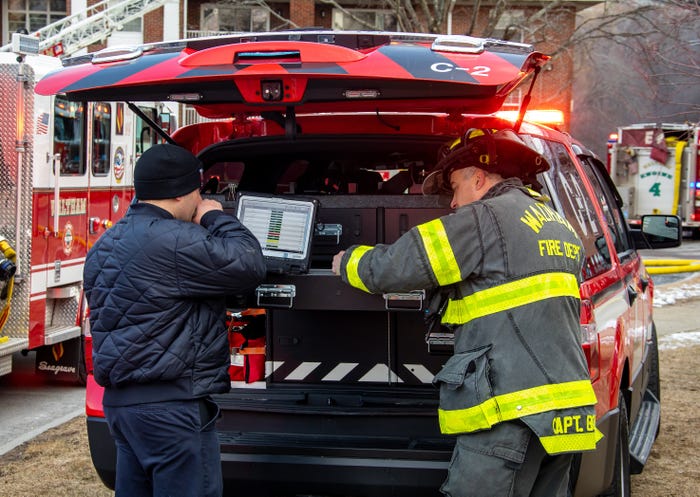Motorola Solutions buys Callyo to enhance command-center portfolio
.jpg?width=1280&auto=webp&quality=95&format=jpg&disable=upscale)
Motorola Solutions this week announced the acquisition of Callyo—a software-as-a-service company that provides cloud-based mobile applications for law enforcement—in a deal that is expected to bolster Motorola Solutions’ command-center software suite, according to a company official.
Andrew Sinclair, Motorola Solutions’ senior vice president and general manager of software enterprise, said Callyo’s two key application suites—10-21, which makes it easier for citizens to communicate with first responders, and the Callyo investigative tools, which are designed to improve the collection of digital evidence—will be beneficial to Motorola Solutions and its customers.
“It’s predominantly additive to our portfolio,” Sinclair said yesterday during an interview with IWCE’s Urgent Communications. “It’s a unique set of capabilities within the industry—only Callyo has these capabilities and the way that they’re packaged and with the footprint that they have. We see that as being added to our CommandCentral suite, particularly on the mobile side.
“We see this as accreditive to our existing business and very valuable to our customers and our core mission.”
Chris Bennett, Callyo founder and chief product officer, said the 10-21 application is proving especially helpful to law-enforcement officers seeking to communicate with citizens that might have information about a case.
With 10-21, the officer can leave a message with the citizen to return the call to a local number—often labeled as coming from the agency—which makes it more likely the citizen will respond, as opposed to dismissing the local call as a telemarketing effort, Bennett said. A responding citizen is given a choice of notifying the officer for a follow-up call or connecting to a non-emergency dispatcher to leave information.
“Officers love it, because it respects their schedules and their time,” Bennett said yesterday during an interview with IWCE’s Urgent Communications. “But it also improves their communications workflows and saves them many hours of checking voicemail messages, which is something they had to do in the past before using 10-21.
“The other side of it is we focus on investigative solutions. If you think about criminal investigators in various different units and disciplines across law enforcement, they more and more rely on mobile tools to perform digital-evidence collection, organize that, be able to search on that, and have accurate reporting on that. Callyo serves that investigative marketplace.
“Between the 10-21 and the Callyo investigative suite, our tools are in the hands of over 1 in 5 police officers in the United States that rely on those further communications.”
When the COVID-19 pandemic hit earlier this year, Callyo engineers quickly developed a video-chat function that leveraged the 10-21 platform to reduce the amount of time that officers had to spend interviewing citizens in person, Bennett said.
Callyo historically has focused solely on serving the law-enforcement sector, but he excited about the potential to reach other critical-communications sectors through Motorola Solutions’ expansive dealer channels, according to Bennett.
“Callyo has routinely turned away requests from fire, EMS, school-resources officers and teachers—other disciplines that are facing similar communications challenges,” he said. “We’ve known all along that our technology can help solve those problems and make their lives easier, but we did not have the resources—as a small company—to tackle multiple things at once.
“Beyond being able to serve our current customers as well or better than we have over the past 10 years, I’m excited to serve an additional set of customers outside the law-enforcement space, and Motorola will help us be able do that.”
Sinclair said that Motorola Solutions has grown its 911 portfolio organically and through acquisitions in recent years, resulting in the company serving “60% to 70% of all seats” in U.S. call centers. With the launch of cloud-based offerings this year, adding Callyo’s capabilities represents “the next piece of this puzzle” to improve efficiencies in public-safety workflows, he said.
“If we can make it so that it’s safer and more efficient for first responders—whether it’s police, fire or EMS—to engage and … be able to bring to bear these tools, that’s important,” Sinclair said.
“We expect that a lot of the changes that we’ve seen during COVID to continue. We’ve done an awful lot of work helping first responders—particularly on the 911 side—work from home with our Command Post product. And we’re seeing a lot of movement to the cloud and cloud solutions, such as Callyo that combine mobile and cloud to help responders deal with the changing environment.”
Motorola Solutions closed the acquisition for Callyo—a private company—last Friday, and the deal was announced on Monday, Sinclair said. Terms of the deal were not announced.
Callyo employees will continue to work out of their existing headquarters in St. Petersburg, Fla.
“Rule number 1 of all acquisitions is, ‘Don’t break the acquisition,’” Sinclair said. “Callyo is an existing, exciting business that complements the Command Central business. We’ll fold them in, we’ll work on integration, we’ll work on bundling around that, but existing customers are going to continue to get product, great service, great innovation.
“As you’ll see from our other integrations, we make a point of not derailing the roadmap—we add to it.”
Bennett said Callyo officials hope that its technology will be used by all types of first-responder entities.
“From Day 1, Callyo was founded to make this amazing technology accessible to all of law enforcement, regardless whether they were from small agencies to large agencies, down to individual officers,” Bennett said. “We firmly believe that the technology should be accessible to help law enforcement be at their best and do their jobs.
“I think that we have done a great job over the past 10 years of making Callyo accessible to departments of all sizes. The theme of keeping that accessibility with Motorola Solutions in our current products going forward is very important, so we don’t disrupt any of the investigations or data communications that are going on among those agencies today.”





